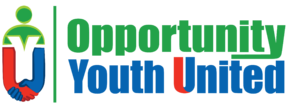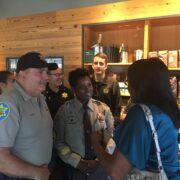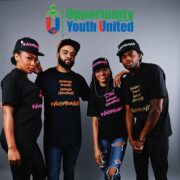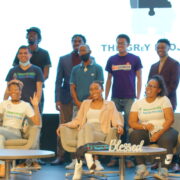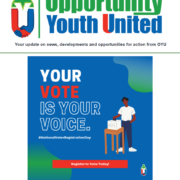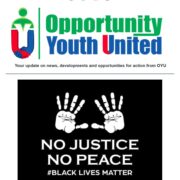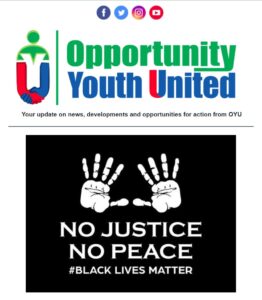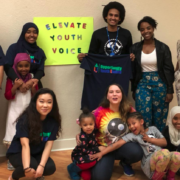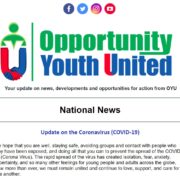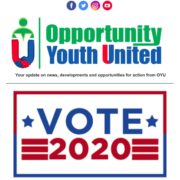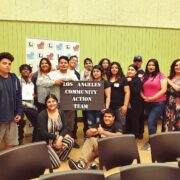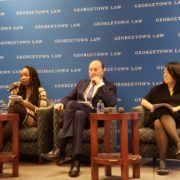Archive for year: 2020
We Voted, What Now?
/in Featured Articles, Media Coverage, Newsletter, OYU in Action /by Shaquana Boykin
“We Voted, What Now?”
Your Voices Matters. OYUnited members mobilized, GOTV, and [YOU]th Voted. During a pandemic and the largest estimate of “growing voters”, people turning 18, compared to this past General Election, according to CIRCLE, the Center for Information and Research on Civic Learning & Engagement, is close to 15 million new voters. So what impact did our OYUnited members have? Read more
Take a look at several OYUnited members mobilizing in their communities before and after General Elections 2020
Atlanta, Georgia
We Voted
You[th] Voted, OYUnited Leaders Shanice Turner and Daniel Rosebud have been participating in non-partisan Get Out The Vote events in Atlanta. Shanice and Daniel are Carolina Voter Mobilization Grantees, who applied for this grant through OYUnited and are individuals working on voter mobilization in their prospective Communities since October 2019, leading up to National Voter Registration Day 2020. Click here to see highlights of National Voter Registration Day 2020 in ATL. Efforts were highlighted in a TIME article published in November 2020, titled Civic Engagement Doesn’t Have to Be Corny.’ How Georgia Pulled Off Unprecedented Youth Voter Turnout” and quoted OYUnited
“It came down to grassroots organizing by groups like the New Georgia Project, Campus Vote Project, Students for 2020, and Opportunity Youth United, which made innovative social media moves and hired younger volunteers to help young voters see themselves in politics.”


What Now
After Elections 2020
So what are our members doing in their prospective communities in a nonpartisan way? Shanice Turner and Daniel Rosebud have mastered the art of partnering within their prospective communities. Here is what is next, happening NOW!
NCYL member Shanice Turner has several nonpartisan GOTV events in ATL mobilizing in her community. From Tik Tok Challenges, Radio Podcast, Debate Watch Party, Debate debriefs, COVID 19 testing, and organizing food giveaways. Shanice strengthened in building partnerships with New Georgia Project and others are targeting young adults 18 to 35 years old. Check out this link of events going on in ATL hosted by Shanice helping to spread the word about the Georgia Senate Run-Off.

Community Leader Daniel Rosebud has put together events he calls “Activations” driven by young adults ages 18 to 35 years young. Earlier in December Daniel Rosebud on Special Report with Areva Martin addressing viewers through a panel dialogue that is informing and inspiring viewers across the country GOTV. A link from his segment is Here.
To keep the presence on social media, Daniel has captured a culture in an effort to GOTV in ATL using #VoiceYourVote – “Activations composed of an overarching message to mobilize in 2020 and 2021”. When asked what would these efforts involve? Daniel explains GOTV is an innovative way – Leveraging nonpartisan information, a series of community engagement activities geared toward first-time voters, and two (2) panel discussions. These discussions have plans of being a viral statement and call to action leading up to a string of local elections in the State of Georgia. Discussions are moderated by the founders of Politicking a mobile application dedicated to improving and galvanizing the millennial vote by providing information about micro and macro politics. The link to the app is www.politickingapp.com and follow the hashtag #VoiceYourVote and follow Instagram @politicking. To follow events hosted by Community Leader Daniel in ATL follow this link.
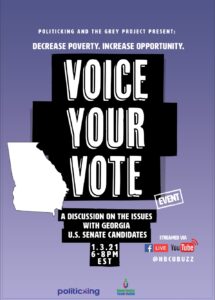
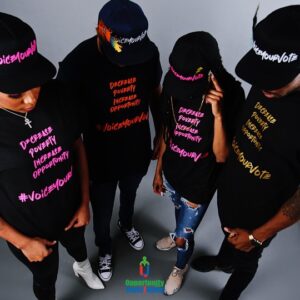

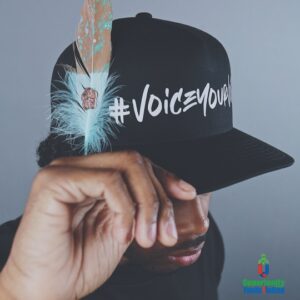
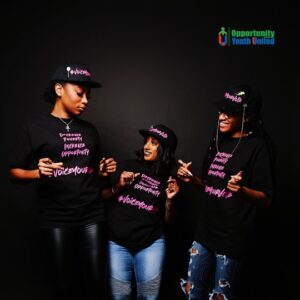
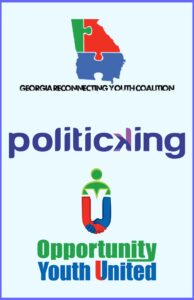
Coming Soon:
- Sacramento, California
- Columbus, Ohio
Sign-up for the Newsletter below.
Author, Shaquana Boykin
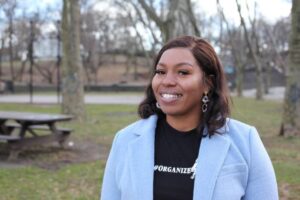
In Atlanta, OYUnited Leaders Help Get Out the Vote
/in Featured Articles, OYU in Action /by Shaquana BoykinHeld every year in the United States, National Voter Registration Day is a nonpartisan civic holiday that celebrates our democracy and encourages voter registration. This year, it happened on Tuesday, September 22nd, and local leaders in Atlanta, Georgia, held several coordinated events to inform and engage their peers ahead of the 2020 elections. We’re excited to share some reflections from Shaquana Boykin, OYUnited’s Digital Engagement Fellow, who attended two events hosted by OYUnited leaders in Atlanta.
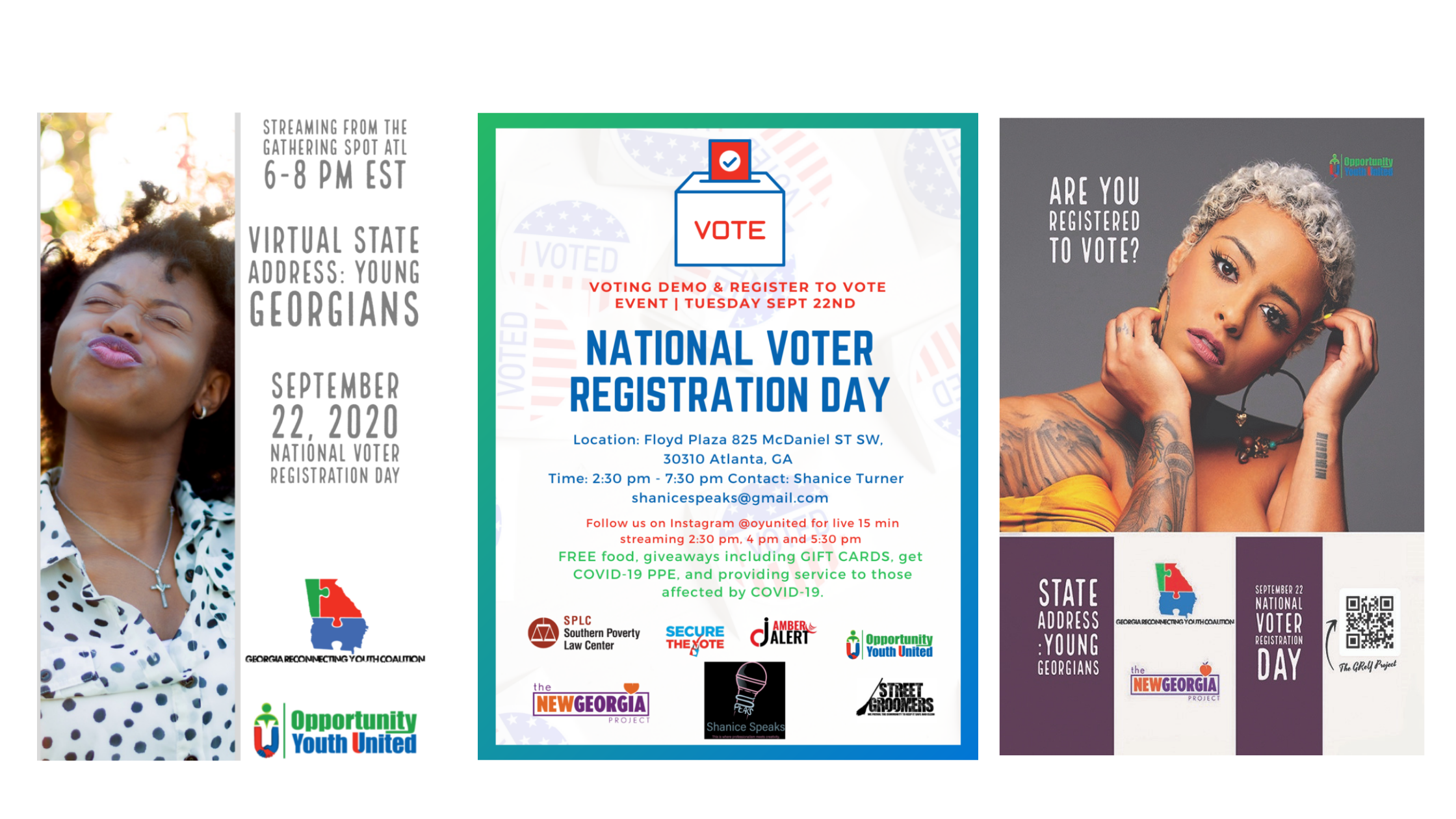
Two OYUnited leaders, Shanice Turner and Daniel Rosebud, hosted local events. Shanice and Daniel are both recipients of the Carolina Fund OYU Civic Engagement Grant, which is supporting five OYUnited leaders and Community Action Teams (CATs) to hold civic engagement activities leading up to the election.
Shanice’s event helped community members learn how to cast their ballot, featuring a demonstration from Secure the Vote, an inclusive, broad-based education initiative that shows people in all walks of life, in every corner of the state, what to expect when they begin voting in 2020. The event was held from 1 – 7pm with several sponsors, free food, gift cards, and personal protective equipment (PPE) giveaways. There were also tables helping register people to vote and reps from community resources ranging from Amber Alert to Street Groomers. (Check out clips of the event on Instagram.)
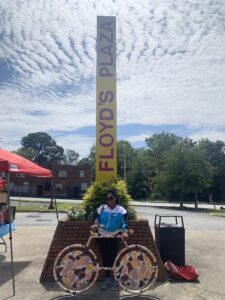
The event took place at Floyd Plaza in the Pittsburgh area of Atlanta. I traveled from New York to participate. I remember looking around and seeing a statue of a bicycle and feeling at home. Although I was far away from my native Brooklyn, the familiar figure of a bike comforted me.
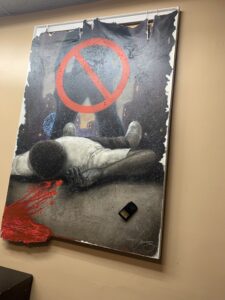
Near the bike, I saw a painting hanging that perplexed me. I looked at Kim Pham, who is a member of the OYUnited Leadership team, and we both were struck by the artist’s layers of texture and colors. I have never really been creative or understood every art form, although as a Community Leader I am able to appreciate raw art and art in general.
Looking at this art work made me question everything I once saw as “safety”: my skin, my clothing, my cell phone, the location I live in and walk. I felt that pain in my heart, the kind that wakes you up, you holding your chest. I felt that, but this pain also had me in a place of reflection, and gave me a push to focus on this day of action to get out the vote (GOTV). Sometimes we need to reflect on our own power, pain and privilege.
“I felt that pain in my heart, the kind that wakes you up, you holding your chest … but this pain also had me in a place of reflection, and gave me a push to continue this day of action… Sometimes we need to reflect on our own power, pain and privilege.”
![]() Floyd Plaza had such a rich feeling of history and community. As we were setting up for the event, people walked over and asked “What time does the event start? When we see tents and tables we know to come by.”
Floyd Plaza had such a rich feeling of history and community. As we were setting up for the event, people walked over and asked “What time does the event start? When we see tents and tables we know to come by.”
This was the gathering spot for all ages young and older. Our first volunteer walked over with her father to tell us that she wanted to help. She was 5 years old and ready to be engaged.
After several hours of entertaining, educating, listening, and getting people to register to vote, Kim and I headed to Daniel’s event.
Daniel’s STATE ADDRESS: YOUNG GEORGIANS was a call to action for all young adults to activate, mobilize, and leverage this 2020 election year to be heard on immediate and systemic barriers concerning their overall permanency, stability and equity as young adults.
It was an event with many layers of youth leadership: The event was a collaboration, coordinated by Georgia Reconnecting Youth Coalition, INC (GRYC) and The GReY Project. GRYC and The GReY Project were founded by Daniel Rosebud, an OYUnited Community Leader, and his co-founder Christopher Prather. They describe themselves as “two young black male adults with lived experience as disconnected youth, who reside in Atlanta, Georgia.”
GRYC is supported by Opportunity Youth United, New Georgia Project, Partnership for Southern Equity, Year Up Atlanta, and ONSET & CO, and Politicking.io, and had young adults representing each of these organizations at the event.
This event aimed to create space for young adults to share and learn what opportunities can be addressed through voting. As Daniel wrote in his press release, “The voting process is not always the easiest process to understand. We aim to articulate the connection of voting to structured opportunities for ourselves and families regardless of who’s in office.”
It was inspiring to see a community leader in his community showing up, advocating, and taking action!
“The voting process is not always the easiest process to understand. We aim to articulate the connection of voting to structured opportunities for ourselves and families regardless of who’s in office.”
The in-person aspects were done safely by practicing social distancing and wearing masks, and upon entering the building, participants received a pre-screening with a temperature check. There were also virtual options to watch remotely, as well.
At the event, Daniel gave an opening talk with several of his movement’s young leaders, followed by a panel discussion and entertainment from Bobbi Strom. During the panel, most questions were displayed on the screen with a QR code for the audience to answer as well. The panelists included Kimberly Pham from OYU/Aspen Community Solutions, and panelists from the GReY Project, Greenlight Fund, and the Georgia Project.
Here were a few of the questions asked of panelists:
- What do you think are the two most urgent issues facing our under-resourced communities and why?
- What makes 2020 a unique voting year?
- Who can and should vote in the 2020 election?
- Which offices are open for the 2020 election ( John Lewis Congressional Seat, Judges)?
The last question was interactive with the audience, asking “Will you, our audience vote, have you registered, will you pledge to actually go to the polls on election day ?” The audience was responsive. Some young adults expressed that they are here today at this event to see what they can do to GOTV.
Audience member Dr. N. Jean Hudley, the Founder and Executive Director of Boys2Men Home & Sanctuary for Youth, Inc, posed a question to us audience members, “What are you all doing to get involved in the political process?” Daniel Rosebud immediately responded, “We have a guest from NYC who has answered the call and won her primary election.” Daniel was referring to my leap to join the Democratic Party of Kings County New York, serving AD 57 as the State Committeewoman. My response to all congratulating me was a call to action, “No matter what role or position you have the power to resign the leadership and policy we all deserve, show up how you can!”
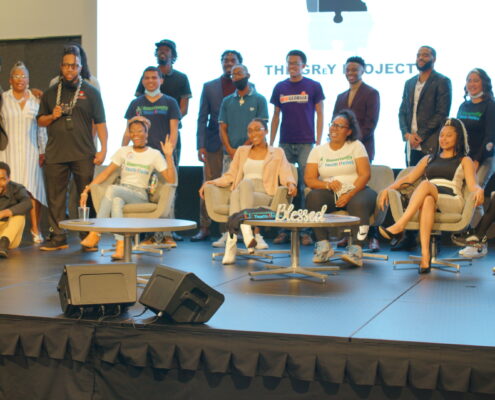
To sum it up, the panelists and audience questions and answers worked well, and it felt good to have a conversation and not be talked at. During the question and answer portion, one audience member posed a question to the panelist and audience and asked, “What are you all doing to get more young people civically engaged?
So, as you reflect on our events hosted by Young Adults on September 22, answer this question for yourself!
For more on the events:
Follow us on Instagram to see clips of the live streams @Oyunited.
The Young leaders who supported content and tech for recordings for Daniel’s event included:
- Frozen Films – (SCAD ATL) – Charles McGinty
- Onset and Co – Brian Philips
- Law The Outlaw – Immanuel Laidlaw
—

Are you ready to vote? 🗳
/in Newsletter /by Danielle VarnerToday is #NationalVoterRegistrationDay! — the day to register to vote (or double check your registration) and make sure your families and friends are registered.
Read our Full September 22nd newsletter here for voting tools and more!
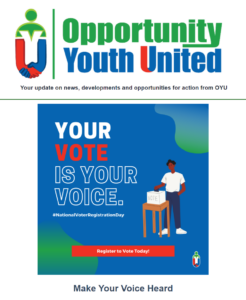
OYUnited: Black Lives Matter – PERIOD!
/in Newsletter /by Danielle Varner“OYUnited stands with all of you and the Black Lives Matter movement in the fight for equity and justice.”
This issue of OYUnited’s e-newsletter addresses the Black Lives Matter Movement and how we aim to rise, show up, use our voices, and mostly importantly, take action.
Read the full archived June 8 newsletter here.
CIRCLE and OYUnited: Improving Voter Access through Research-Fueled Action
/in OYU in Action /by Caitlin Kby Adam Strong
Our ongoing partnership with Opportunity Youth United (OYUnited), a movement of current and former opportunity youth, has shown that there are many levers to increase young people’s access to voting. Many of these involve policy reform, while others can be pursued and accomplished by community actors. One key opportunity is building mutually beneficial relationships with local election administrators to improve access to voting for those who are often disadvantaged in civic life and participating in elections—particularly those who live in low-income communities and in black and brown communities.
We call this work Expanding the Electorate. During the first phase of this project, we partnered with OYUnited in participatory research focused on identifying possible barriers and challenges to young voters, particularly low-income youth. In our initial report, we outlined large inequalities in young people’s knowledge of essential information needed to vote (e.g., almost 2 in 5 youth surveyed did not know where to vote) as well as other structural challenges (e.g., 1 in 4 needed a ride to the polls) that impeded low-income youth’s ability to participate in elections. Based on these findings, we created 10 recommendations for how election administrators can work to increase voter engagement.
In order to advance this work, in 2019 we coordinated an initiative to give grants to three pilot sites—groups of community-based young leaders, in Seattle, Los Angeles, and Tucson—to join a learning cohort. Over the course of seven months, they identified barriers and challenges that may prevent young people in their communities from casting a ballot, and then pursued a partnership with their local election administrators (EAs) to systematically improve voter access in one specific, targeted way. Both our initial research and the subsequent success of our pilot sites were made possible by a grant from the Democracy Fund.
The work of young leaders in each site leveraged, highlighted, and expanded on key takeaways from our research. Some highlights:
- Young people and young organizers have information, networks, and experiences that can be helpful to local election administrators’ efforts to reach more people in their communities. Our Los Angeles pilot site expanded the capacity of its local election office by creating a platform for EAs to educate and disseminate information systematically across their network of youth serving organizations.
- Local election administrators often have many responsibilities and limited capacity to perform proactive outreach. Youth organizations can help by creating opportunities to hear from a wide diversity of youth about their experiences with elections and how youth are (or aren’t) finding election information. In Seattle, young people partnered with the King County Elections office to expand direct outreach and voter education and registration efforts to low-income and housing-insecure young people. They hosted six voter education and engagement listening circles across their county and led a social media campaign focused on dispelling common myths and false assumptions articulated during those listening circles.
- Direct communication and collaboration between election administrators and young people can increase youth knowledge and interest in elections and trust in local election officials. In Tucson, the young leaders had to learn about and navigate a complex local electoral administration system with multiple offices overseeing different functions. Eventually, their partnership developed mailers to educate youth about voter rights and to increase trust among young people who incorrectly thought that they were disenfranchised because of a lack of ID, a criminal record, or various other issues.
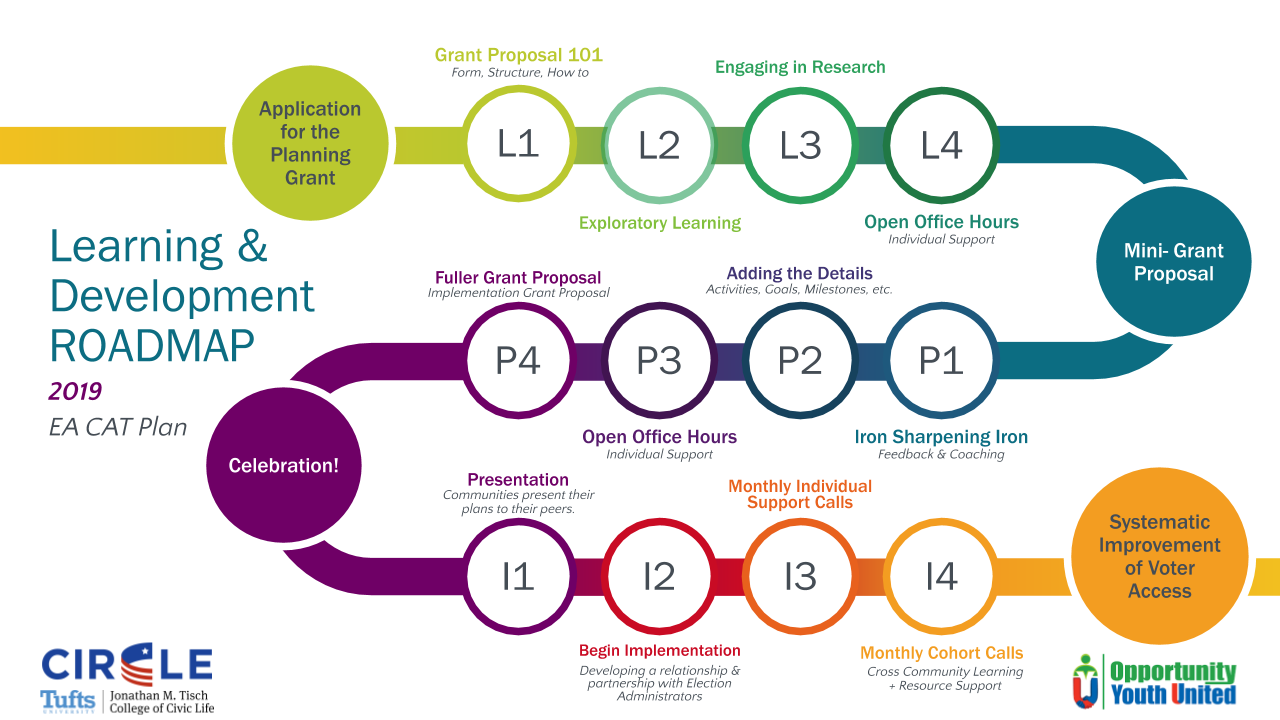
Supporting Young Leaders and Reducing Barriers to Voting
To establish our pilot sites, we partnered with three of OYUnited’s youth-led community action teams (CATs). The first stage involved the CATs exploring our research to build on their existing knowledge and experiences of barriers and challenges to participating in elections. The second stage focused on developing potential action plans for partnering with election administrators to improve voter access in one specific way. And the final stage involved implementing their plans, building those relationships, co-developing joint projects and initiatives with election administrators, and learning as a cohort across the three sites.
Developing the CAT members’ capacities as young leaders was a central component of this initiative. That involved learning about election administrators’ roles and elections work more broadly, finding and interpreting data, and grant-writing. We supported this development through monthly support calls and community learning sessions that included supplemental resources, talking points, partnership tips, and group problem-solving.
In designing the initiative, we recognized that time and funding is often a barrier for young leaders to participate in these and other civic opportunities, so we worked to ensure young people were compensated for their time. We split our project and application into two stages that would allow us to award a small grant to those who joined the initiative to research, craft, and write a proposal, and a second grant (if selected) for progressing to stage three and implementing their plans. We also encouraged grantees to include in their budgets compensation for the young leaders who participate and lead in their local initiatives. Above all else, we wanted to ensure the opportunities provided in each community were meaningful, transparent, and accessible.
Each pilot site’s approach to improving voter access in their community varied based on a multitude of factors. Below are short spotlights for each one:
Seattle, Washington
In Seattle, the community action team had an existing relationship with the King County Elections office, which was proactively seeking to improve voter outreach and education to opportunity youth in ways that the CAT was uniquely suited to support. They hosted voter education and engagement listening circles across Seattle’s re-engagement centers (locations serving opportunity youth to help them get their GED and connect them to employment opportunities) and youth homeless shelters. Leveraging the lessons learned from the listening circles, the youth-led CAT launched a social media campaign that used infographics addressing common myths and barriers to voting identified by young people. In this way, the Seattle CAT aimed to increase voter access for opportunity youth by providing essential information, addressing the transportation barriers and other challenges affecting youth, and increasing trust between election administrators and opportunity youth.
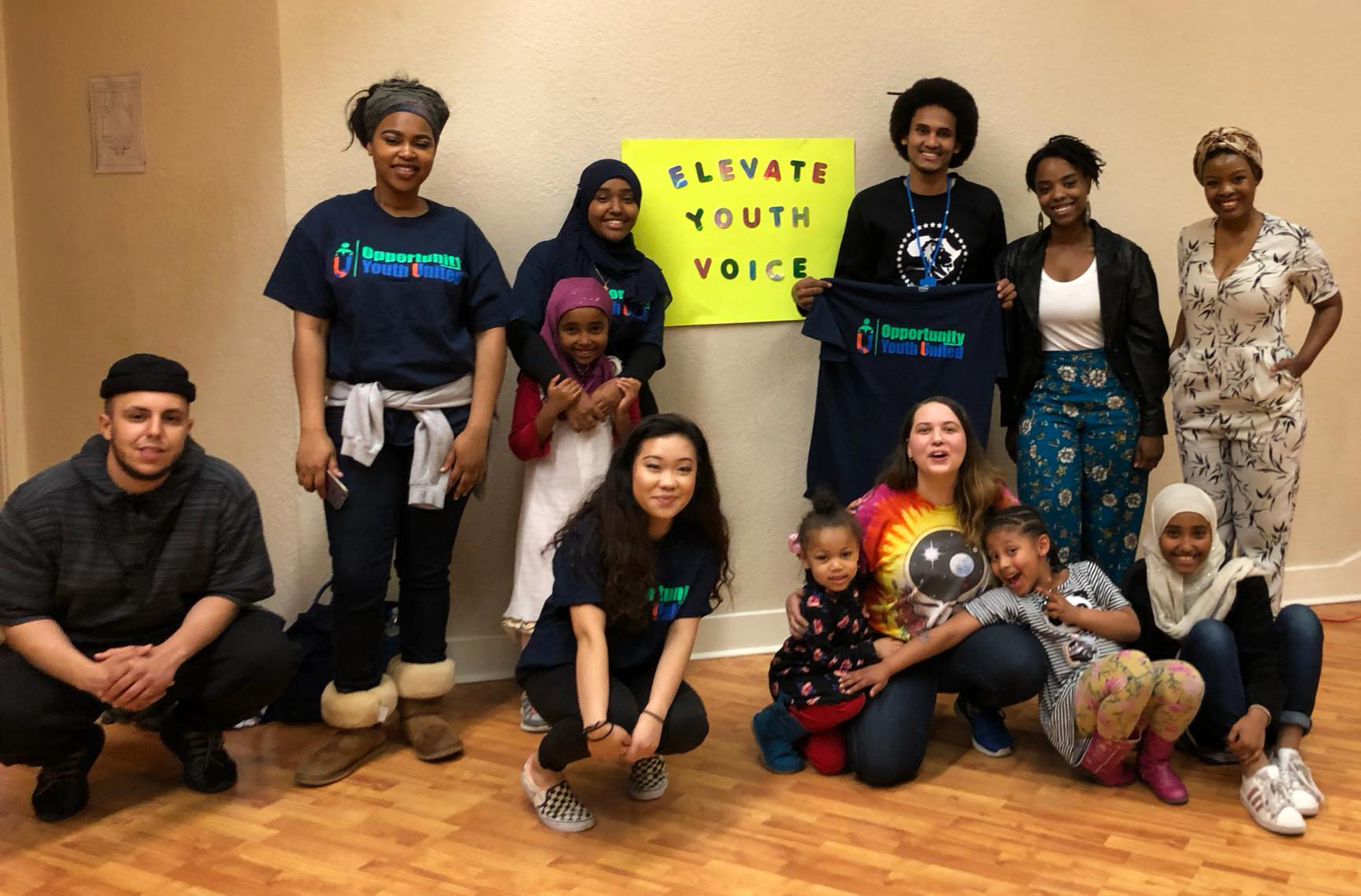
Los Angeles, California
In Los Angeles, the youth-led CAT was able to expand the capacity of their local election office by creating more connections for EAs to educate and disseminate information systematically across a network of youth serving organizations. They convened district-wide organizational stakeholders to streamline election conversations and education. The CAT’s young leaders wanted to address a perceived culture in which youth-serving organizations in their community did not communicate or engage enough with their local election administrators to ensure their young people had the information they needed to register to vote and cast a ballot. Given local changes to the voting process in Los Angeles, the young leaders thought it was essential to partner with their election office and expand its capacity. The CAT built a relationship with local election administrators from the ground up by attending mock elections and stakeholder meetings hosted by the election office.
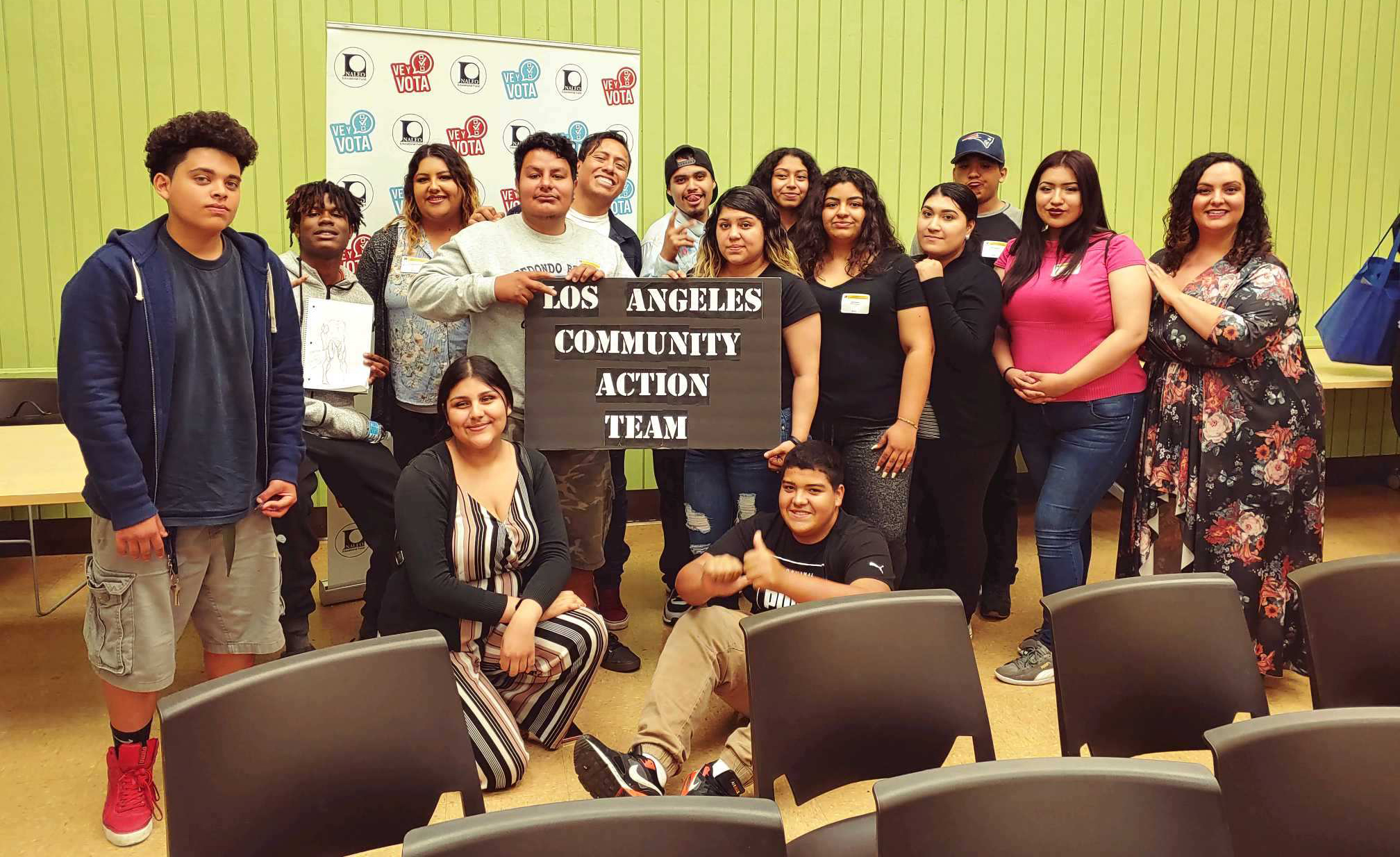
Tucson, Arizona
In Tucson, the CAT partnered with their local County Recorder’s office to produce and share voter educational materials tailored for opportunity youth outlining critical information about voting. The young leaders had identified that many of their peers were unsure of their voting rights. This tracks a finding from our participatory research project with low-income young people, which highlighted that many had inaccurate information about who was disenfranchised and under what circumstances. For example, one in five (20%) youth we surveyed believed that if they were convicted of a misdemeanor they could not vote, and two in five (41%) were unsure if they could. In fact, they could vote, and the majority of states now allow those with a felony conviction to have their voting rights restored.
The CAT had no prior relationship with their local election office and administrators, and initially faced difficulties in establishing contact. They persisted, and by leveraging a contact in the Mayor’s office, they became aware that some election-related functions are administered by their county Recorder’s office and not the local election office. They reached out via email to that Recorder’s office and scheduled a meeting with administrators there who were enthusiastic to meet and collaborate with the young leaders.
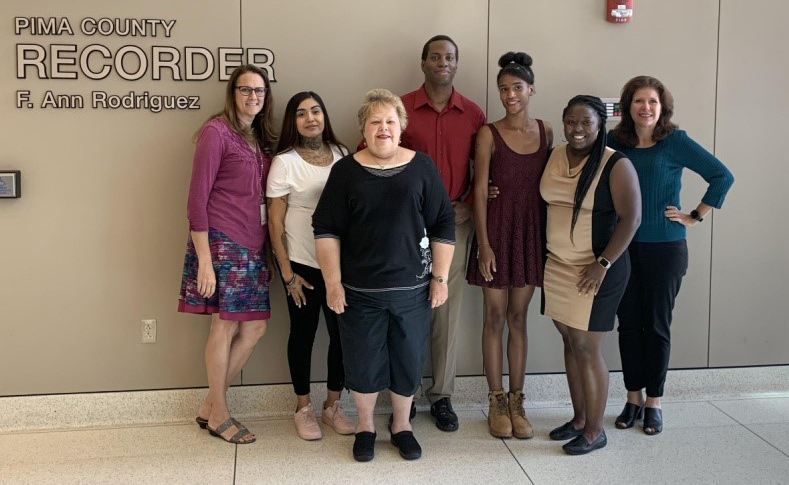
Each pilot site faced and overcame a host of challenges related to their unique project aims, navigating multiple systems and stakeholders, and developing and nurturing their relationships and eventual partnerships with election administrators. All of the pilot sites plan to build on the successes they achieved during this grantee initiative with projects that include election administrators as they continue to pursue improving voter access in meaningful ways.
The work of our grantees also underscores other important issues that youth and organizations should keep in mind as they consider potential partnerships. Election administrators are often incredibly busy during election years, all of our pilot site teams noted that communication and outreach with EAs was difficult because of scheduling. Patience, persistence, and flexibility are essential to successful collaborations and partnerships. Additionally, it is important to recognize that some EAs may not initially be open to partnerships for a multitude of reasons: from being overworked to having prior negative experiences with other groups or organizations. Navigating relationships with your local election office may not be easy or possible in all situations; however, when it succeeds, a community’s young voters can reap the benefits.
Of course, for the 2020 election there is an additional complication: the COVID-19 pandemic. Election administrators, organizers, campaigns, and others around the country are beginning to grapple with what that will mean for the voting process and for the vital task of reaching out to young voters. This will certainly be a major challenge, but it can also be an opportunity that highlights the value and importance, now more than ever, of partnerships between EAs and youth.
Already some jurisdictions are considering or expanding opportunities for young people to serve as poll workers or take on other election-related roles (health and safety permitting) as we face the prospect of elections shaped by the pandemic.
In the coming weeks, we will continue to distill and share lessons learned from our pilot sites for practitioners and others looking to replicate their success by partnering with their local election administrators to expand and diversify the electorate. To learn more about local election administrators and officials, consider reading Stewards of Democracy, a report produced by the Democracy Fund that covers the 2018 survey results of more than 1,000 elections officials nationwide regarding their opinions about election administration, access, integrity, and reform.
OYUnited: Census, COVID-19, and More News!
/in Newsletter /by Danielle VarnerBy Lashon Amado
“There has been a lot of movement on the federal level around this pandemic. Bills are being passed and leaders are stepping up in various ways…”
This issue of OYUnited’s e-newsletter includes updates on federal policy, the Census 2020 questionnaire, local action, fellowship, job opportunities and more!
Read the full archived April 1 newsletter here.
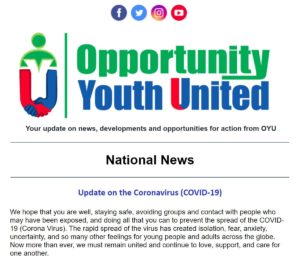
OYUnited: Get Ready for SUPER Tuesday!
/in Newsletter, OYU in Action /by Danielle VarnerBy: Lashon Amado
“It’s primary season and a big election year. Tomorrow is Super Tuesday and it is time to have your voice heard! Elected officials only listen to the people who vote, and we have issues in our communities that we need them to address!”
This issue of OYUnited’s e-newsletter is a call to action encouraging YOU to SHOW UP to the polls. Together, let’s make sure that candidates for office know that young adults in low-income and under-resourced communities are paying attention, are stepping up, and are coming together to make sure that our issues are addressed.
Need resources?
Read the full archived March 2 newsletter here.
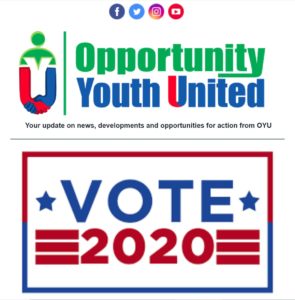
In Three Cities, OYUnited CATs are Working to Boost Youth Voter Turnout
/in OYU in Action /by Caitlin KBy Maharddhika
Youth tend to vote at lower rates than older voters and are often called apathetic because of it, but they are far from it. The recent March for Our Lives and Climate Strikes are just the latest actions initiated by the youngest potential and future voters. Young people are highly engaged and their passion for change is being channeled into many different forms of civic engagement — organizing, marching, striking, and initiating movements for change.
A recent study by CIRCLE and Opportunity Youth United (OYUnited), “Expanding the Electorate,” reinforces that young people care and value. In the study, 88 percent of youth surveyed said they believed that voting does make a difference. Yet, they found it difficult to engage in elections because they felt they lacked access to necessary information. Respondents said they struggled to get information about where to vote, needed to arrange a ride to the polls, and also had to rearrange their work and school schedules.
The study also found many young people were unclear about their voting rights. One out of five (20%) of those surveyed believed that if they were convicted of a misdemeanor they could not vote. In every state, young people can still vote if they have been convicted of a misdemeanor.
“An intention to vote starts with believing you have the right to vote”, says Adam Strong, a Research Impact Fellow at CIRCLE.
Low-income youth, especially Opportunity Youth, often face more barriers to voting than their peers, from transportation to childcare, and difficulty in getting time off from work to get to the polls.
Connecting Data & Real Life
For the past several months, CIRCLE and OYUnited have been using this data as the foundation for three pilot sites across the country that are identifying local challenges to voting for Opportunity Youth and working to systematically improve local voting conditions.
On a brisk November afternoon in 2019, Adam Strong, a Research Impact Fellow of CIRCLE, and Lashon Amado, Deputy Director of OYUnited, stood before a room of advocates, youth development experts, and funders, leading a breakout session at the 2019 Opportunity Youth Network Summit in Washington, DC. In their session, Addressing Inequalities in Voter Access through Action Research, Adam and Lashon reviewed the findings and shared the amazing success of their three pilot sites led by OYUnited’s youth-led Community Action Teams (CATs) in systematically improving voter access ahead of the 2020 presidential election.
The pilot sites launched in the spring of 2019, with the three CATs using the study as a foundation to help them identify local voter access issues in their community to drive local action.
The Coalition for Responsible Community Development based in Los Angeles, California, United Way of Tucson and Southern Arizona, and Soar based in Seattle, Washington are partnering with local election administrators to co-develop solutions to improve voter access, particularly among Opportunity Youth and low-income young voters.
These pilot sites chose to partner with their local election administrators because they control many levers that can help address many of the challenges and barriers to voting previously identified. Every state has election administrators who run elections at the state and local levels. Each state and jurisdiction has different laws affecting how they administer an election and what they have a say in.
On the Ground: Preparing for November
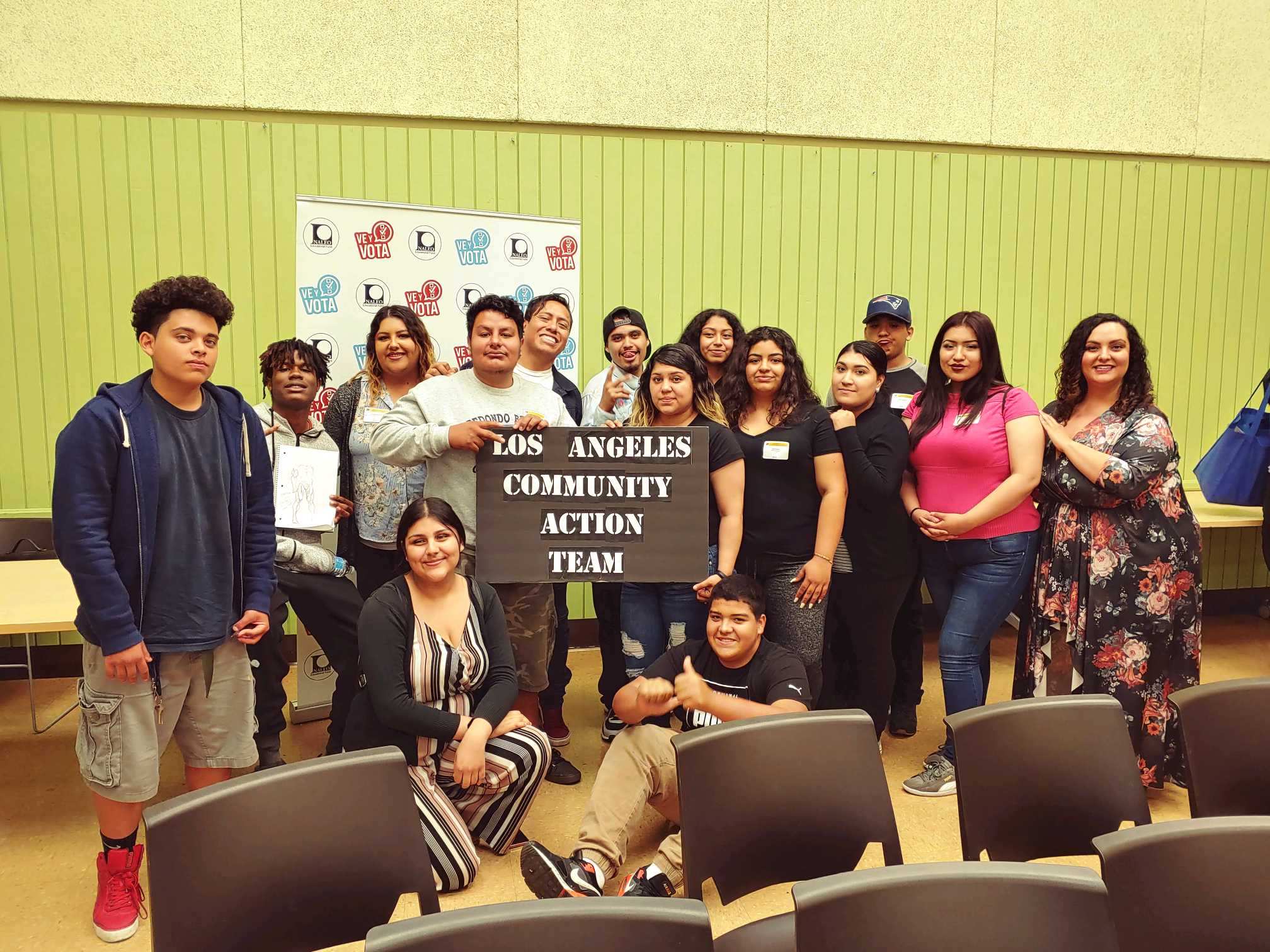
In Los Angeles, California, the Coalition for Responsible Community Development set an ambitious goal: to change the culture around voter education in LA. The youth identified the lack of communication between nonprofits and election administrators as one reason young people were not getting the information they needed to register to vote and cast their ballots. The young leaders leveraged their convening power to bring together youth-serving organizations and election administrators at events to streamline conversations and ensure young people had access to voting information. With state-level policy changes impacting how Californians would cast a ballot, the young people seized this opportunity to improve voter access ahead of the 2020 presidential election.
“[Election administrators] meet many, many people every day. I have to stay on their radar and keep Opportunity Youth on their radar,” says Luis Bautista-Morales, lead organizer with OYUnited’s Los Angeles CAT.
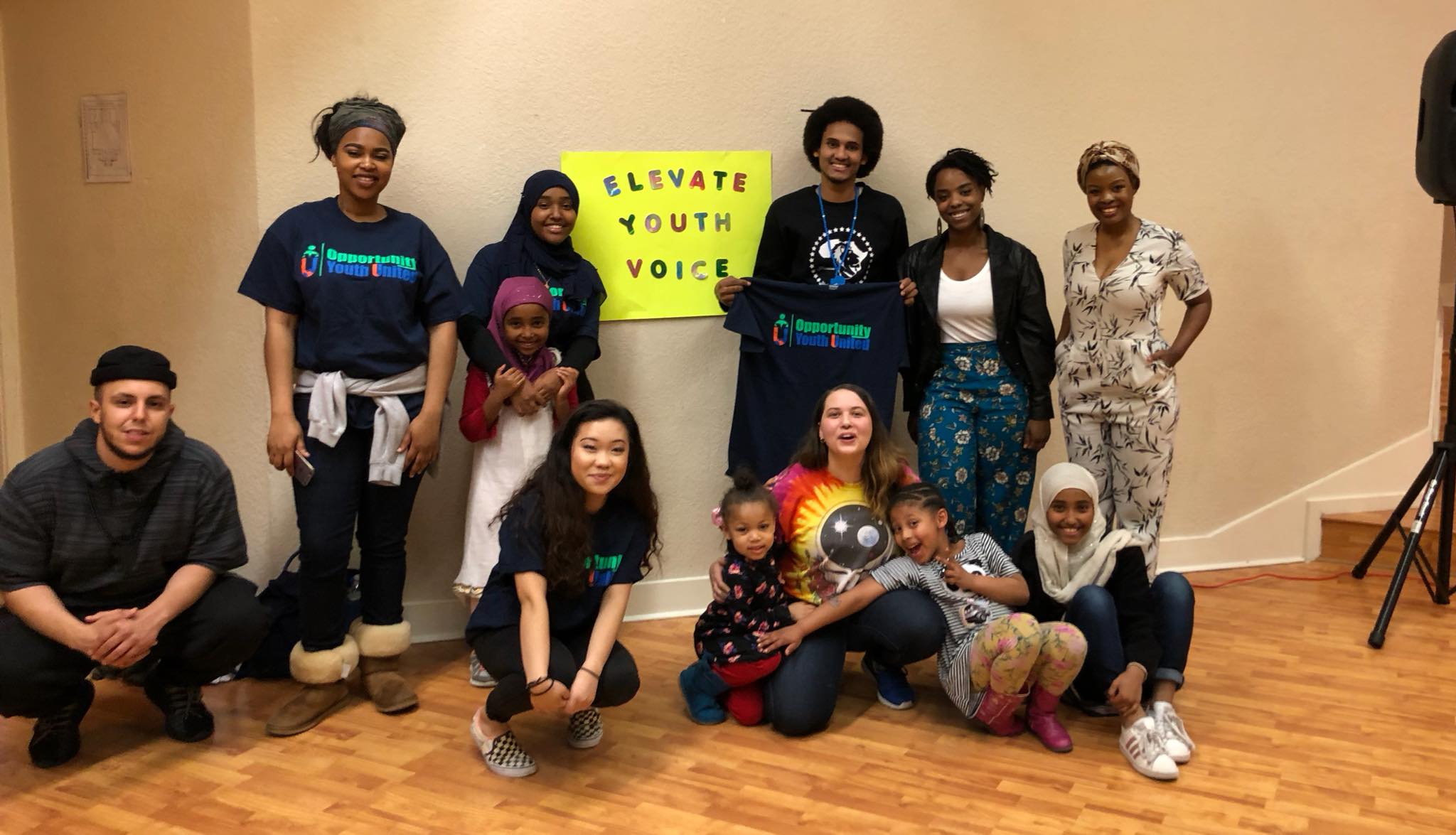
In Seattle, Washington, Soar hosted a series of six community-driven voter education conversations in partnership with local election officials across King County. Through those conversations, the young people identified common misconceptions and myths related to voting held by their community and then created a localized social media campaign dispelling those myths ahead of their local election in November of 2019.
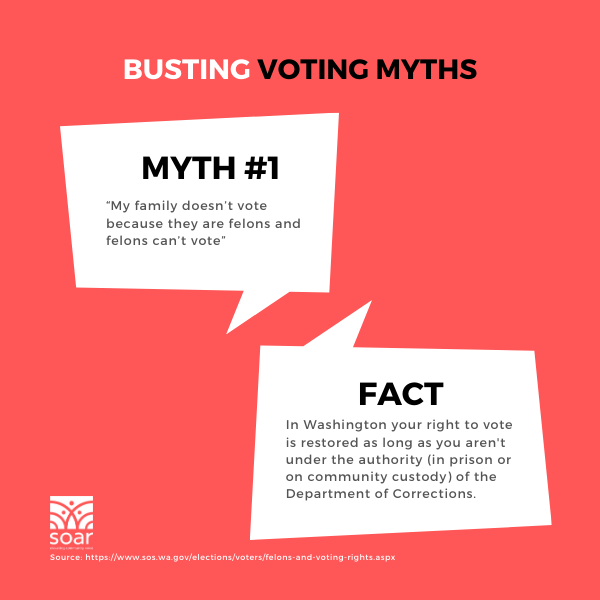
One of the first conversations was held in one of the largest alternative high schools in the state, located in an area that is grappling with rapid gentrification. The meeting brought together King County election administrators and young voters.
“It was a huge milestone because I was really able to shift their perspective. We are able to start to think about what is missing. We brainstormed and figured out what we should do next,” says Makayla Wright, Youth Voice Organizer with Soar, and coordinator of the effort in Seattle.
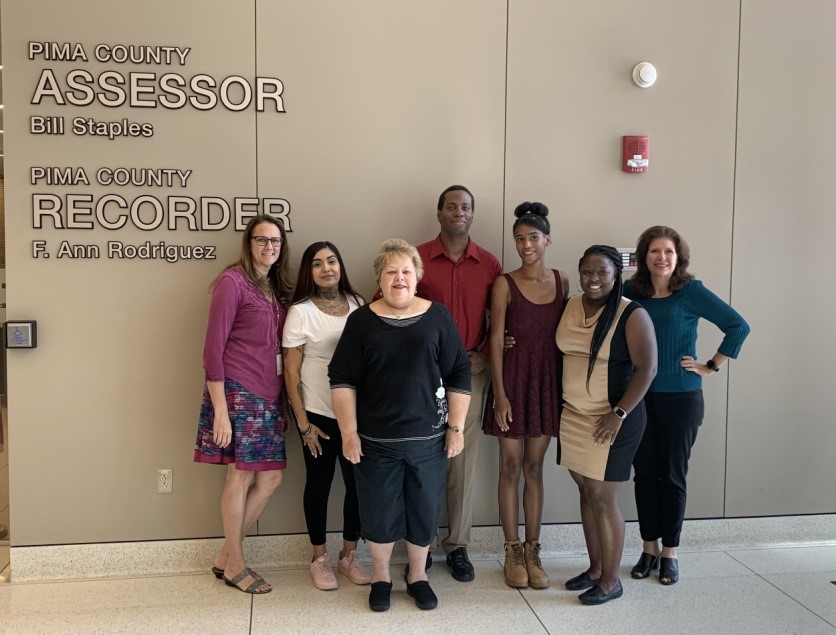
In Tucson, Arizona, the United Way of Tucson and Southern Arizona has launched a largely youth-led effort to adapt and produce voter educational materials tailored for Opportunity Youth. They are working in partnership with election administrators to produce and share the guides ahead of the 2020 election.
The guides will include details about voting rights. “Some of the Opportunity Youth in our community have felony convictions and just aren’t aware that they can restore their rights. That is going to be a big education piece in our material. We will include information about how they could do about restoring their rights so that they can vote,” says Jasmine Jones, Youth Engagement Coordinator for Cradle to Carrier’s United Way of Tucson and Southern Arizona.
In all three pilot sites, election administrators were eager to partner with our youth-led community action teams to improve voter access. Since our young leaders were persistent and started early in 2019, they were able to make an impact ahead of the 2020 election.
The success of our CATs shows that you can improve voter access without having to wait for policy change. Young people care, and when we work across sectors we are able to ensure that all young people have access to making their voices heard — and that includes at the ballot box.
We have uncovered many lessons and best practices for partnering with election administrators to improve voter access and are currently developing those resources for practitioners. Be sure to check in with us in the coming week. And remember, election administrators are critical assets to your community and we highly recommend all civic and election related organizations to strengthen their relationships with them.
You don’t have to wait for policy change to improve voter access for your community. You can take action today and have more success than you can imagine. The future is yours.
Is it Time for a Youth Opportunity Guarantee?
/in Featured Articles, OYU in Action /by Caitlin KBy Adam Strong and Shawnice Jackson
Should our nation have an “opportunity guarantee” of education, training, and employment for all young adults?
How can we as a nation truly achieve equity without a framework — and what could this framework look like? What do young adults need to be successful in high school and beyond?
Members of OYUnited were invited to Georgetown Center on Poverty and Inequality to grapple with these and related questions. For example, how do schools, colleges, and employers work with young adults to improve their experiences?
At the root of the discussion was a recent proposal by the Center on Poverty and Inequality for a national Youth Opportunity Guarantee. The Youth Opportunity Guarantee is a vision and strategy for policymakers and stakeholders at all levels to ensure all young people have access to:
- A high school credential or equivalent,
- A variety of post-high school training, education and credentialing, and
- Quality training for careers, national service opportunities, or a career pathway.
The Youth Opportunity Guarantee would require youth-serving systems, like our education, workforce, justice, and child welfare systems, to work together to connect current services and create a better experience for young adults. The framework also ensures youth and adults work together to make the vision a reality, with a focus on equity.
As OYUnited believes in and values the power of youth-adult partnerships, equity, and systems reform, we believe in the strategy behind the Youth Opportunity Guarantee.
About the Opportunity Guarantee
The Youth Opportunity Guarantee seeks to drive change for Opportunity Youth by:
- Ensuring a variety of post-secondary options that lead to an employment pipeline (not a one-size-fits-all approach to post-secondary education and training)
- Building on youth-adult partnerships as the cornerstone of this work (youth as experts)
- Increasing cross-system collaboration and reform (system alignment and reform)
- Working from an equity-based lens (values)
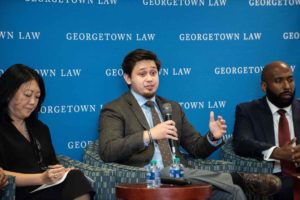
Why We Need an Opportunity Guarantee
In our roles as OYUnited founding members and members of the National Council of Young Leaders, we sat on the panels at the Georgetown event and shared our views on the Guarantee.
Adam served on the first panel, which focused on the need for this type of approach. Here’s a snapshot of his remarks:
Many would benefit from the Youth Opportunity Guarantee. Currently, there are 4.5 million Opportunity Youth, youth who are currently seeking opportunity and also represent an opportunity for our country. At the same time, there are over 6 million unfilled jobs in America. With the right training and support, these young people could easily fill the majority of those jobs. All young people deserve the equal opportunity to pursue a life that they believe is meaningful and, for the vast majority, that includes working.
Connecting these young people to those jobs boosts our economy and improves the lives of millions of young people and their families.
When young people don’t have a pathway to advance their education, training, and skills, or obtain gainful employment, they are forced into survival mode and into an experience and life void of dignity, hope, and significance.
When young people don’t have a pathway to advance their education, training, and skills, or obtain gainful employment, they are forced into survival mode and into an experience and life void of dignity, hope, and significance.
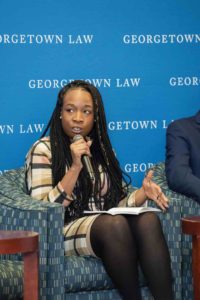
How to Operationalize It
Shawnice served on the second panel, which focused on ways to make the Youth Opportunity Guarantee work in real life. One of the key takeaways from this panel included how to address foreseeable challenges in building and sustaining youth-adult partnerships. Using lessons that OYUnited has learned through our partnerships, like the Reconnecting Youth Campaign and the Opportunity Youth Forums, we recommended the following strategies: addressing the readiness of youth and adults to work together, addressing preconceived notions and biases (youth of adults and adults of youth), implementing cultural competency training (pre-work and ongoing), and creating accountability and ongoing feedback loops.
Without these key strategies in place, we run the risk of doing more harm than good.
If we wish to change systems to better serve Opportunity Youth, system leaders must be prepared to get out of silos, share data, and be comfortable with being uncomfortable.
If we wish to change systems to better serve Opportunity Youth, system leaders must be prepared to get out of silos, share data, and be comfortable with being uncomfortable.
In all, we believe that the Youth Opportunity Guarantee provides a powerful framework to create a pipeline to employment success for all young people, one that meets them where they are, and outlines promising recommendations for operationalizing it.
If you would like to learn more about the framework click here. Also, consider signing up for our newsletter so you don’t miss out on the latest news as we continue to work towards creating a brighter future.
__
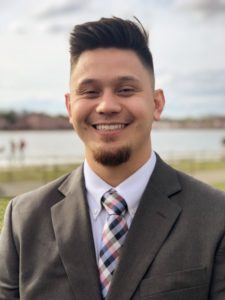 Adam Strong is a founding member of OYUnited and member of OYUnited’s National Council of Young Leaders. A passionate advocate and lifelong learner, he has six years of experience in national policy advocacy, using his skills in policy analysis and communication & strategy he aims to influence policymakers to implement policies that increase economic mobility and decrease poverty in America.
Adam Strong is a founding member of OYUnited and member of OYUnited’s National Council of Young Leaders. A passionate advocate and lifelong learner, he has six years of experience in national policy advocacy, using his skills in policy analysis and communication & strategy he aims to influence policymakers to implement policies that increase economic mobility and decrease poverty in America.

Shawnice Jackson is a Policy Advocate and former Opportunity Youth committed to building equitable and strong systems, policy, and pathways to opportunity for underserved and marginalized youth and communities. As a co-founder of the National Council of Young Leaders & Opportunity Youth United, Shawnice works to advise funders and policy makers on the needs and potential of Opportunity Youth across the country. She also bolsters the larger Opportunity Youth movement through her consultancy work and leadership. Shawnice’s current leadership roles include: Advisory Board Member with The Opportunity Youth Network; Leadership Council Member with The Opportunity Youth Incentive Fund; Opportunity Leader with Opportunity Nation; Leadership Committee Member with the International Youth Foundation’s Reconnecting Youth Global Advisory Committee and Steering Committee Member for America’s Promise Alliance.
About Us
Opportunity Youth United is a national movement of young people and allies working to increase opportunity and decrease poverty in America. It is supported by many sponsors, partners, and funders.
